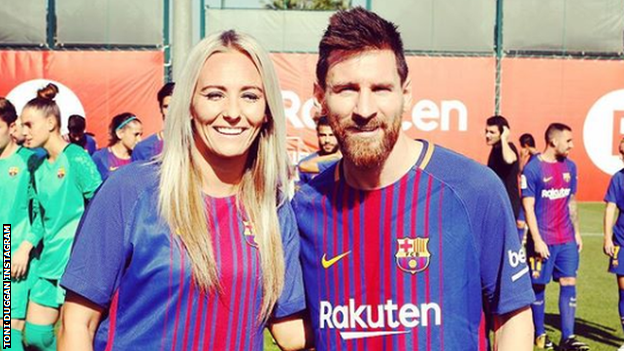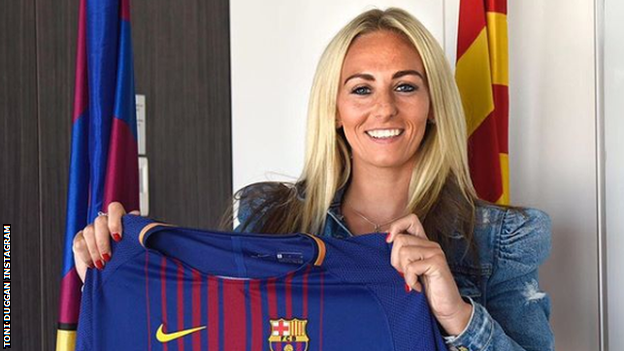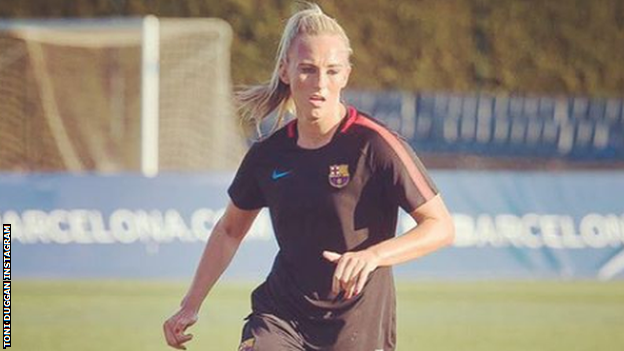Toni Duggan: Barcelona forward on challenges - and benefits - of playing overseas
- Published
- comments

Toni Duggan is one of very few England internationals playing abroad
Toni Duggan is a rarity among England internationals.
The striker is one of a handful of players in the senior England set-up - men's or women's - to be playing overseas, having made the decision to leave Manchester City for Barcelona last season.
The forward, who has 58 caps, the latest of them in the 1-1 friendly draw with Australia on Tuesday, wanted to challenge herself technically, tactically and mentally, leaving behind the safer environment of the Women's Super League, where she was a star name and had won everything the English game had to offer.
So what has the 27-year-old learned from her experience, and what could her male counterparts (Eric Dier is the only member of Gareth Southgate's World Cup squad to have played abroad) learn from moving overseas?
'Football in England was becoming too repetitive'
As Duggan relaxes on a sunny afternoon at Barcelona's spacious training ground, a few miles outside the city centre, it is interesting to hear her say she never planned to play abroad.
After breaking into Everton's first team at 16 and subsequently joining Manchester City to win honours galore and become an international regular, she was perfectly prepared to stay in England for the rest of her career.
Gradually, however, something changed, and she started to think further afield.
"When I was younger I never thought I'd be brave enough to go and play abroad," Duggan says.
"I loved playing in England. But after a few years I didn't find it challenging enough. I wouldn't say I was bored, but it was becoming too repetitive - playing with and against the same players year after year.
"The time was right for a change. I wanted to take my career and my life to the next step, learn a new style of play and prove myself in a new environment where I was starting from scratch. I wanted a new spark."
Many of Europe's biggest clubs came calling. Duggan chose Barcelona, but she had no idea what lay in store.
'I didn't speak any Spanish, I could never be relaxed'

Toni Duggan initially found it hard to adjust to life at Barcelona following her move from Manchester City
Even though she was given a warm welcome by her new team-mates and plenty of behind-the-scenes assistance from the club, Duggan found her first few months in Spain tough.
"It was so difficult, partly because of the language," she recalls. "I didn't speak any Spanish when I arrived, and I was so tired when I came home from training sessions, not only because of the football but also because of the language.
"Even when I was eating breakfast before training or getting changed in the dressing room, I always had to be listening and concentrating, just to work out what was going on. I could never be relaxed."
On the pitch, it wasn't any easier. The training methods and style of play at Barcelona were far removed from anything Duggan had experienced in England, and it took time to adjust.
"It was frustrating but I had challenged myself so I wasn't going to throw in the towel. And I was having an amazing time - I was loving it even though it was really difficult.
"I was eager to learn, so I couldn't wait for the next training session because I wanted to be better and understand more. I had to learn how things work around the club - the rules and the standards, what's expected of us. You just have to adapt."
And the process of adaptation was even more difficult on the pitch than off it.
A higher standard and raised expectations

Toni Duggan finds expectations are higher in Spain
As soon as she started training with her new team-mates at Barcelona, Duggan was struck by one thing: the ease with which every single player could control the ball.
"They're all so good technically," she enthuses. "The standard is far superior to England.
"At Manchester City we used to do rondos [a training drill where players form a circle and pass the ball while others in the middle try to dispossess them] and we'd be lucky to reach 10 passes. But you come here and when you're in the middle it's like being in a washing machine, the ball just goes around and around!"
Duggan soon realised there was a simple explanation for that greater level of technical ability: practice, practice, practice.
"They've been learning technique since they were babies," she says. "That's their focus and emphasis. For example, in England the day after a game is usually a day off or some gentle warm-downs, but in Spain we come in and do really intense passing drills and technical work.
"For players here, losing the ball is the worst thing you can do. They get so angry with themselves. In England if you receive a bad pass and you lose possession, you'll blame the pass. Over here, the pass can come at your throat or your knees and everyone still expects to control it instantly."
'Headless chickens' in England, mentally challenging in Spain

Keeping possession is key in training sessions at Barcelona
Higher levels of technical ability were not the only difference Duggan noticed after moving from England to Spain, because she was also plunged into a new world in terms of the mental aspects of the sport.
"The game here is so tactical," she says. "We always have to keep possession, draw in the opposition to create space, and a lot of our focus during the week is tactical.
"It's very position-specific. We don't do any possession drills without also thinking about positioning. In England, you might have a possession game of six v six and it's like headless chickens, people running around everywhere just trying to keep the ball and be strong in tackles.
"But in Spain, you always stay in your position. You're still in your shape, for every drill. In England you might think about team shape and how you're going to press one or two days before a game, but here every single drill is about shape and tactical thinking.
"Sometimes that can slow down the training, and in England the sessions are more physically intense, but I've learned that you have to play with your head. Forget the running - your head has to be quicker than your legs."
After spending a year with Barca, the new mental demands she has encountered have also encouraged Duggan to analyse her performances in a more nuanced manner.
"I think about the game differently," she says. "I watch a lot more video than I used to. It's like studying because I'm trying to learn a new way of playing, and I'm looking out for different things.
"In the past I'd look at whether I was creating chances, or if I could have got my shot off quicker. Now I'm looking at my positioning, where I should be to help the team. It's much less ball orientated, and much more about where I am on the field and how my positioning is helping another player."
Could Sancho be a trailblazer in the men's game?
Sancho scores first goal of season as Dortmund win 7-0
After everything she has experienced in the past 15 months, Duggan firmly believes she has significantly improved as a player since joining Barcelona, and that other English players would benefit from making a similar move.
"I'm a better player now," she says. "I've come on technically, I'm more relaxed on the ball, more composed with possession, and I see different pictures positionally.
"I'd recommend it to anyone. Sometimes English players struggle to adapt to different styles of play, and coming abroad forces you to do that because you have no choice - you have to adapt."
Young female players may be inspired to follow in the footsteps of Duggan and fellow England internationals Lucy Bronze and Isobel Christiansen, who play for European champions Lyon.
And in the men's game, Duggan believes the rapid progress being enjoyed by Jadon Sancho at Borussia Dortmund could prove to be a game-changer in the next few years.
London-born Sancho came through the youth ranks at Watford and Manchester City before moving to Dortmund in 2017. The 18-year-old made 12 Bundesliga appearances last season but has really caught the eye in the current campaign, starting in the Champions League victory over Club Brugge, signing a new four-year contract earlier this month and earning a call-up to the full England squad.
"Seeing one person make that transition can encourage others to do the same," says Duggan. "And I think the younger generation are looking at Jadon Sancho and thinking: 'I could do that.' There are so many clubs out there."